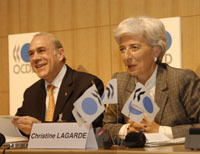5 June 20 08: The Organisation for Economic Co-operation and Development’s (OECD) Forum 2008 and the annual OECD Council at ministerial level considered ‘Climate Change, Growth and Stability’ and ‘Outreach, reform and the economics of climate change,’ respectively, during their meetings in Paris, France, from 3-5 June 2008.
The OECD Forum is a ‘multi-stakeholder summit’ […]

5 June 20
08: The Organisation for
Economic Co-operation and Development’s (OECD) Forum 2008 and the annual
OECD Council at ministerial level considered ‘Climate Change, Growth and
Stability’ and ‘Outreach, reform and the economics of climate change,’
respectively, during their meetings in Paris, France, from 3-5 June 2008.
The OECD Forum is a ‘multi-stakeholder summit’ that brings
together representatives from business, labor, civil society, governments, and
international organizations to discuss key issues on the international agenda.
This year’s Forum addressed the role of biofuels, sustainable cities,
innovation and climate change, as well as the relationship between climate
change and other issues including nuclear energy, partnerships and finance. The
OECD ministerial summit discussed the economic impact of climate change, rising
food prices and a broad range of other trade, growth and development
issues.
France, represented by Christine Lagarde, Minister
for the Economy, Industry and Employment, chaired the meeting, with Mexico and
Switzerland as Vice-Chairs. On the economics of climate change, Ministers
agreed that each country needs to devise its own comprehensive mix of policies,
depending on national circumstances, but emphasized the importance of
international cooperation. They suggested, inter
alia, that future OECD analysis could: study and compare concrete national
and international policy options to reduce greenhouse gas emissions from a wide
range of activities; assess the impact of alternative policies on
competitiveness, carbon leakage, financing, technological development and
transfer; and study the economic costs, benefits and distributive aspects of
climate change adaptation and mitigation policies. Many Ministers recognized
that OECD analysis provides valuable inputs to the G8 Summit in Hokkaido, the
climate Conference of Parties (COP) 14 in Poznan, Poland, in December 2008, and
COP 15 in Copenhagen, Denmark, in 2009. Ministers also addressed food-price
inflation and its linkages to broader issues such as alternative fuels, climate
change and impacts on distribution of income and growth within economies. They
welcomed the analysis and recommendations of the OECD work on food prices and
the OECD-FAO Agricultural Outlook, and welcomed further work aimed at
continuing to monitor developments in agricultural markets and promote sound
international policy responses to address the long-term structural factors
driving food prices. [Chair’s
summary of the OECD Council at Ministerial Level, Paris, 4-5 June 2008 –
Outreach, Reform and the Economics of Climate Change]